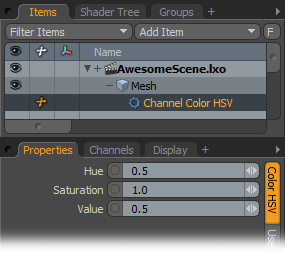 Channel Color HSV
Channel Color HSV
This modifier produces an RGB color (3 channels) output, from an input color defined by hue, saturation and value. This allows the user to smoothly animate the hue, saturation or value of a color with correct interpolation, rather than making excessive keyframes for red, green, and blue channels individually.
Hue/Saturation/Value: These options determine the color value using the HSV color model. Their RGB output values can be linked to a materials RGB value input channels to control the materials colors with the modifier.
This modifier produces an RGB color (3 channels) output, from an input color defined by Kelvin color temperature scale based on thermal dynamics. This allows the user to smoothly animate the color of the sky at sunset, for instance, with correct interpolation, rather than making excessive keyframes for red, green, and blue channels individually.
Kelvin: These options determine the color value using the Kelvin color model. Their RGB output values can be linked to a materials RGB value input channels to control the materials colors with the modifier.
This motion generator creates smoothly changing random value by taking a 1D slice through a 3D fractal noise field.
Input: x-coordinate for slice
Position: y-coordinate for slice
Speed: scale time to make z-coordinate for slice
Seed: random start time to move z-coordinate
Frequencies: number of 'octaves' of noise to add together
Frequency Ratio: ratio of frequencies of successive octaves
Amplitude Ratio: ratio of amplitudes of successive octaves
Amplitude: Scaling factor for the output
Offset: Offset added to the output
This modifier can be considered more of a motion generator, since it simply generates the standard sine wave so common in nature. When applied to a channel, this modifier creates smoothly undulating values. Use a 'Channel Noise' generator for a more random effect.
Amplitude: Size of base waveform without damping. The channel will range from -amplitude to +amplitude.
Frequency: Frequency of wave in cycles per second (Hz)
Phase: Phase shift for wave in form of a percent of a wavelength/cycle (i.e. 90 deg shift = 90/360 = 25%)
Damping: Damping amount for wave expressed as fraction of amplitude lost per cycle
Offset: A 'DC' offset added to the wave. The value will range from 'offset - amplitude' to 'offset + amplitude'.
The 'Channel Relationship' modifier defines a non-linear relationship between two values that can be visually modified using a Graph curve. Unlike a standard direct link where, once applied, modifying the incoming channel instantly affects the outgoing channel, once a relationship is linked, the relationship itself must be defined numerically in the Relationship interface window that appears in the 3D viewport. This only appears when the 'Channel Relationship' item itself is selected.
Relationships are defined via the buttons in the window, the two channels are listed as Driver and Driven, meaning the values of one output (Driver) are controlling the input of another (Driven). The white square button sets a relationship key based on the current Driver and Driven values. The arrows jump between keys and the red x deletes the current key. The 'Graph' button opens the graph editor for further curve refinement. These videos will demonstrate the use and application of the Relationship Modifier-



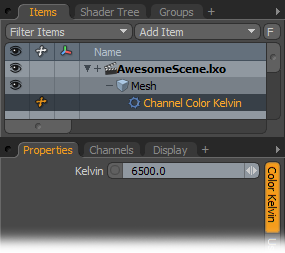 Channel Color Kelvin
Channel Color Kelvin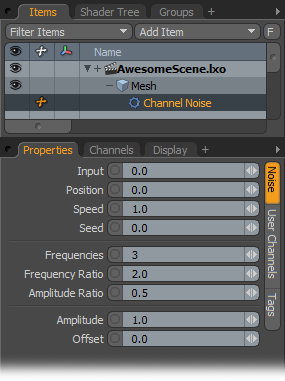 Channel Noise
Channel Noise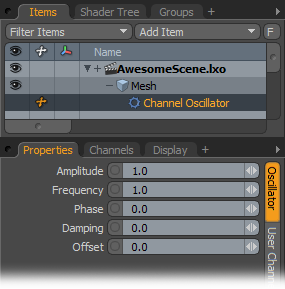 Channel Oscillator
Channel Oscillator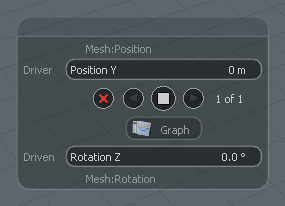 Channel Relationship
Channel Relationship